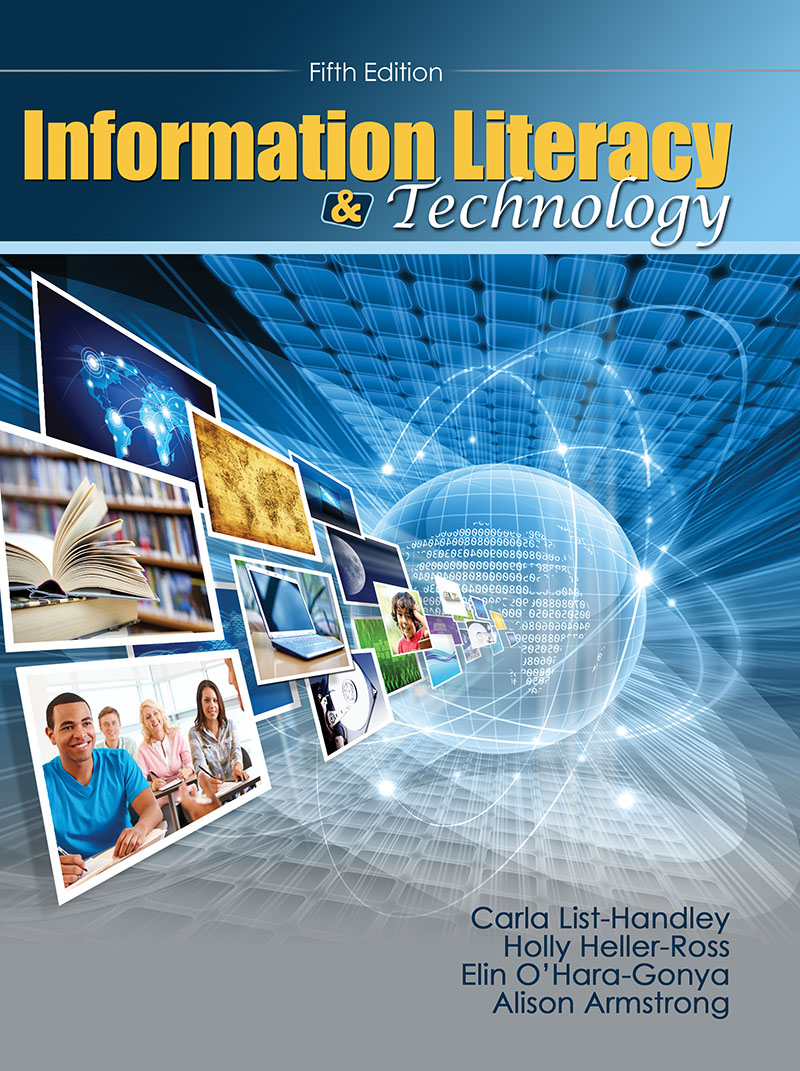Information Literacy and Technology
Author(s): Carla List-Handley , Holly Heller-Ross , Elin O'Hara-Gonya , Alison Armstrong
Edition: 5
Copyright: 2013
Pages: 136
Edition: 5
Copyright: 2013
Pages: 136
Choose Your Format
Information Literacy and Technology explains the basic systems used to organize information and helps readers clearly define their information needs. This text addresses concepts and skills that are foundational to information literacy and identifies issues and questions of appropriate and ethical use of information.
Information Literacy and Technology features:
- Learning objectives at the beginning of each chapter
- Chapter highlights at the end of each chapter
- Search Tips and Concept Checks that emphasize important concepts and provide opportunities for further clarity
- Skill Checks that provide opportunity for students to apply concepts as they learn them
- Screenshots throughout the text to help readers visualize textual concepts and skills
- Suggested assignment questions for each chapter with additional assignments on the companion website
- A Comprehensive research assignment on the companion website
- A Glossary that defines important information and technology literacy research terms
- A Bibliography that cites sources quoted in the text and provides a model for readers
Author Biographical Info
Introduction to the Fifth Edition
How to Use This Book
Chapter 1 Planning
Learning Objectives
What Is Information?
Why Is It Necessary to Organize Information?
What Are Some Ways to Organize Information?
Library Classification Systems
How Is the Web Organized?
The Research Process
Making Your Topic Work
Aspects of a Topic, Contexts for a Topic
Getting Help in Analyzing Your Topic: Tools for Research
Information Characteristics and Your Information Need
Physical Format and Organization of Information
Finding Information Sources in Different Organization Systems
Chapter Highlights
Chapter 2 Searching
Learning Objectives
Search Tools
The Scope of Search Tools
What Search Tools Do
Selecting the Best Search Tool(S)
What Do Search Tools Contain?
Analyzing Your Topic and Using the Web
Boolean Logic and Boolean Searching
Field-Specific Searching
Subject Headings, Tags, and Facets
Searching Topics Effectively
Chapter Highlights
Chapter 3 Evaluating
Learning Objectives
Evaluating While Planning
Evaluating While Using Search Tools
Access to “Invisible” Information
Types of Evaluative Criteria
Pulling the Evaluative Criteria Together with Star
Star: Using All the Criteria to Make Your Final Selections
Chapter Highlights
Chapter 4 Integrating
Learning Objectives
Ethical, Legal, and Socioeconomic Issues Surrounding Information and Information Technology
Citation vs. Plagiarism
The Make-Up of Citations
Style Manuals and Formats
Endnotes or Footnotes
Thinking About Information
Ownership of Information
Privacy Issues
Censorship
The Digital Divide
Chapter Highlights
Glossary
References
Index
Information Literacy and Technology explains the basic systems used to organize information and helps readers clearly define their information needs. This text addresses concepts and skills that are foundational to information literacy and identifies issues and questions of appropriate and ethical use of information.
Information Literacy and Technology features:
- Learning objectives at the beginning of each chapter
- Chapter highlights at the end of each chapter
- Search Tips and Concept Checks that emphasize important concepts and provide opportunities for further clarity
- Skill Checks that provide opportunity for students to apply concepts as they learn them
- Screenshots throughout the text to help readers visualize textual concepts and skills
- Suggested assignment questions for each chapter with additional assignments on the companion website
- A Comprehensive research assignment on the companion website
- A Glossary that defines important information and technology literacy research terms
- A Bibliography that cites sources quoted in the text and provides a model for readers
Author Biographical Info
Introduction to the Fifth Edition
How to Use This Book
Chapter 1 Planning
Learning Objectives
What Is Information?
Why Is It Necessary to Organize Information?
What Are Some Ways to Organize Information?
Library Classification Systems
How Is the Web Organized?
The Research Process
Making Your Topic Work
Aspects of a Topic, Contexts for a Topic
Getting Help in Analyzing Your Topic: Tools for Research
Information Characteristics and Your Information Need
Physical Format and Organization of Information
Finding Information Sources in Different Organization Systems
Chapter Highlights
Chapter 2 Searching
Learning Objectives
Search Tools
The Scope of Search Tools
What Search Tools Do
Selecting the Best Search Tool(S)
What Do Search Tools Contain?
Analyzing Your Topic and Using the Web
Boolean Logic and Boolean Searching
Field-Specific Searching
Subject Headings, Tags, and Facets
Searching Topics Effectively
Chapter Highlights
Chapter 3 Evaluating
Learning Objectives
Evaluating While Planning
Evaluating While Using Search Tools
Access to “Invisible” Information
Types of Evaluative Criteria
Pulling the Evaluative Criteria Together with Star
Star: Using All the Criteria to Make Your Final Selections
Chapter Highlights
Chapter 4 Integrating
Learning Objectives
Ethical, Legal, and Socioeconomic Issues Surrounding Information and Information Technology
Citation vs. Plagiarism
The Make-Up of Citations
Style Manuals and Formats
Endnotes or Footnotes
Thinking About Information
Ownership of Information
Privacy Issues
Censorship
The Digital Divide
Chapter Highlights
Glossary
References
Index
